by Brian Hioe
語言:
English /// 中文
Photo credit: 胡宏志/NewTalk
Linda Gail Arrigo (艾琳達), who first came to Taiwan in the early 1960s as a teenager, is a veteran of the Taiwan democracy movement in the 1970s and 1980s. Though banned from entering Taiwan after the events of the Kaohsiung Incident, she continued to advocate for Taiwanese democracy afterwards outside of Taiwan and has continued to be a participant in social movements after eventually being able to return to Taiwan in 1990. From 2007 to 2012, Arrigo taught at Taipei Medical University.
New Bloom first met up with Arrigo in August of 2015 for the interview, then followed up with another meeting in January 2016 to update the interview for the present.
Political Background
Brian Hioe: I assume most readers already know a little about your life story. I’m curious about how you would describe what led you to Left politics when you were young. Such as your politicization and eventual radicalization.
Linda Gail Arrigo: You’ll find it in English in my book A Borrowed Voice (2008) or in my Chinese biography (2011), but in my biography I don’t write in such detail. I think a lot of my early understanding of class issues was because of my experience with my father as a child in Taiwan. My father, who was with the military, was also with a lot of elites in Taiwan. Like Anna Chennault. Her daughter was my classmate. And I saw the lifestyles of many elites in Taiwan.
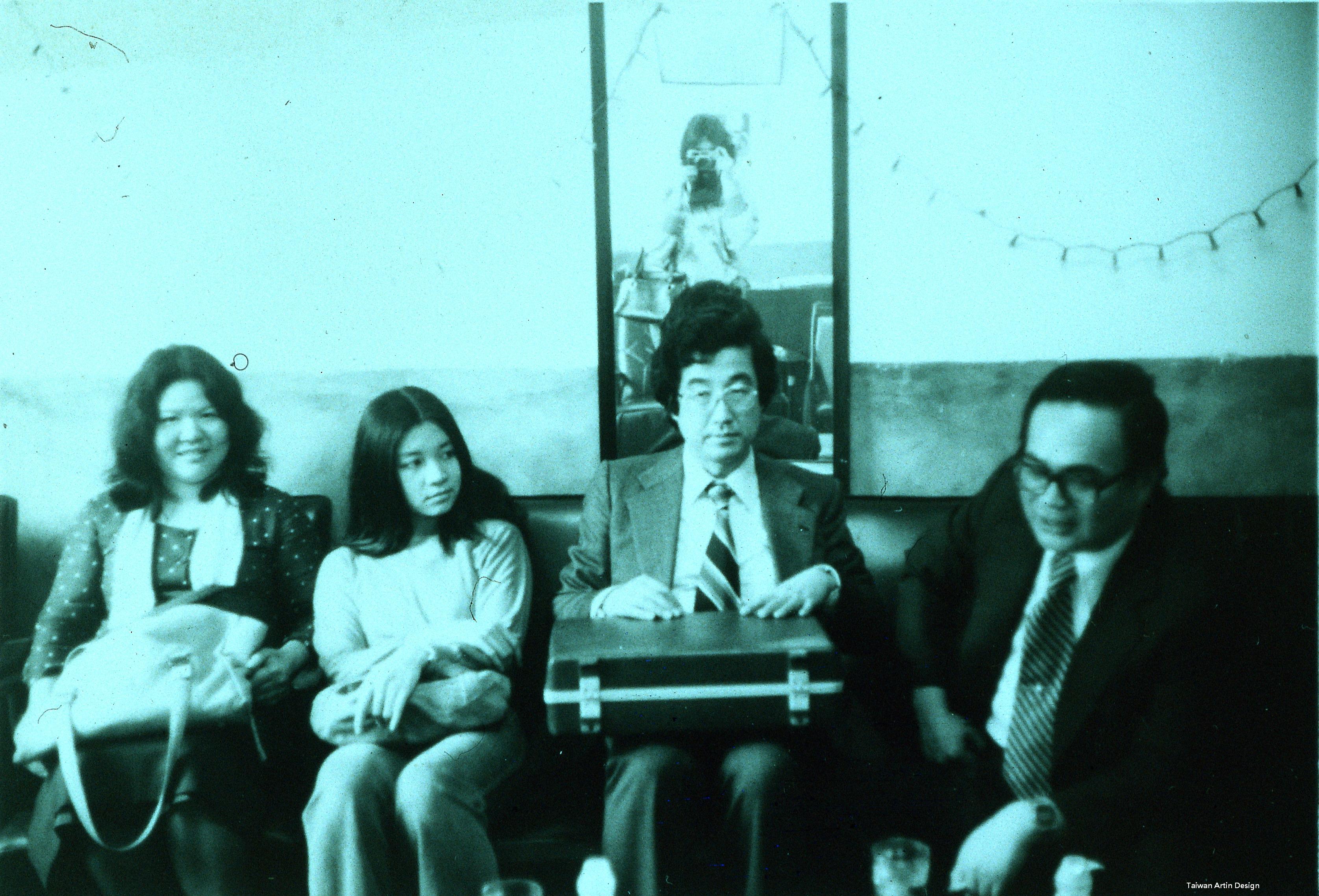 Chen Chu, Tien Chiu-Chin, a Japanese professor sent by Amnesty International, and a lawyer surnamed Su who was part of the dangwai movement in a picture taken by Linda Gail Arrigo, who is visible in the mirror. Photo credit: Linda Gail Arrigo
Chen Chu, Tien Chiu-Chin, a Japanese professor sent by Amnesty International, and a lawyer surnamed Su who was part of the dangwai movement in a picture taken by Linda Gail Arrigo, who is visible in the mirror. Photo credit: Linda Gail Arrigo
But in my daily activity roaming around the streets, when I really experienced Taiwan directly, I saw people who were working in the streets, working in the markets, and speaking a different language, Taiwanese. I really had a sense of the huge gap between the wealthy ruling class and the ordinary people. I think this immediately gave me a very graphic picture of this society. It was very clear to me, even when I was young, that this society’s inequality was supported by military might and by coercion. Because you could see police all over the streets. And the American military was pretty frank in talking about how the US military supported Chiang Kai-shek, although they knew he was corrupt.
So it was quite clear to me that this was a colonial society from my very early experience. And a semi-colony of the United States. Then when I went to study anthropology and sociology, especially in the 70s, my views on this were further developed. Of course, this was through the anti-Vietnam war movement and so on. But I think when we look at people’s motivations, you really see that their early experience and the direct experience are generally very important in the formation of a motivation. I think I can explain my motivation in that way. I had a direct understanding of US imperialism and also a personal feeling for people in Taiwan.
Strengths and Weaknesses of the Sunflower Movement
BH: The next thing I want to ask is about the present. Because we’re a publication which came out of the Sunflower Movement. Given your long background in the Taiwanese democracy movement in various forms, both within and outside Taiwan, what would you have to say about the Sunflower Movement? Like what were its strengths and what were its weaknesses?
LGA: This is a question that I cannot quite answer sufficiently, or that I don’t have an adequate basis to understand. I think that the Sunflower Movement is indirectly one of the protests against globalization that has happened around the world, but I don’t think that the Sunflower Movement itself had a very high level of self-awareness of what is the position of Taiwan in the world economy and so on. But I think that the direct issue of polarization of wealth in Taiwan and that the lack of economic future is very clear and has had an impact on motivating young people. They realize their salaries have not gone up.
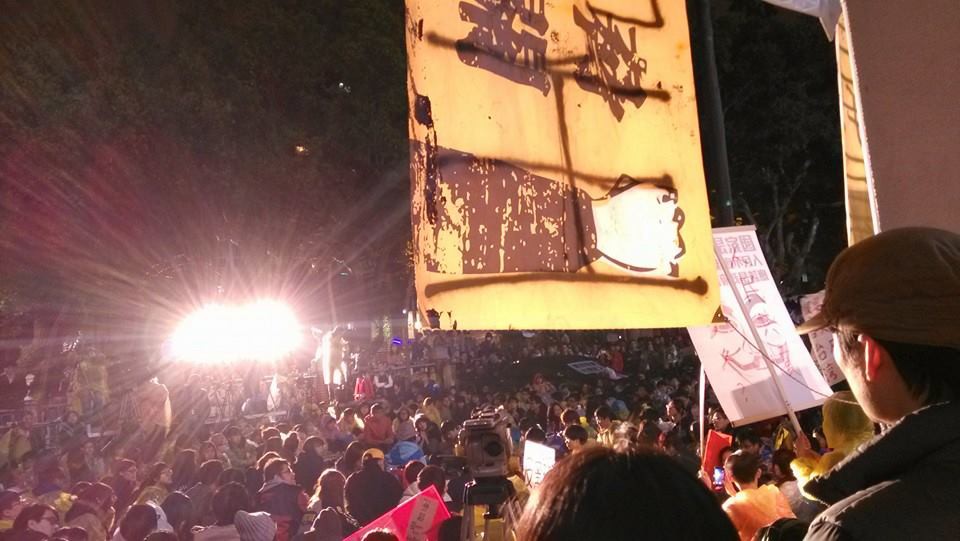 The front of the Legislative Yuan during the Sunflower Movement. Photo credit: Brian Hioe
The front of the Legislative Yuan during the Sunflower Movement. Photo credit: Brian Hioe
This is the same as in the US and other developed counties such as Spain, which have been rapidly deindustrialized as globalization proceeds. I think the very rapid deindustrialization in Taiwan is the underlying cause. And it seems a lot of people in the Sunflower Movement do have this perception. But I think the misperception of the Sunflower Movement is that this is just because of China and I think that is not quite an adequate understanding. I just think that the Sunflower Movement had many of the shortcomings of the previous Taiwanese independence movement, a kind of insular view, a view from this island of what happened here.
But if we look at any movement, almost all movements around the world have this nature of being a reaction to very immediate experience. Just in many other countries there are often cores of leadership that have a very broad view based on analysis of global history. And in the case of the Sunflowers there are some people who have influenced the Sunflowers such as Lin Yifang—at least I interviewed Lin Yifang at length last May and he definitely does have a global view, as well as tactics of organized non-violence.
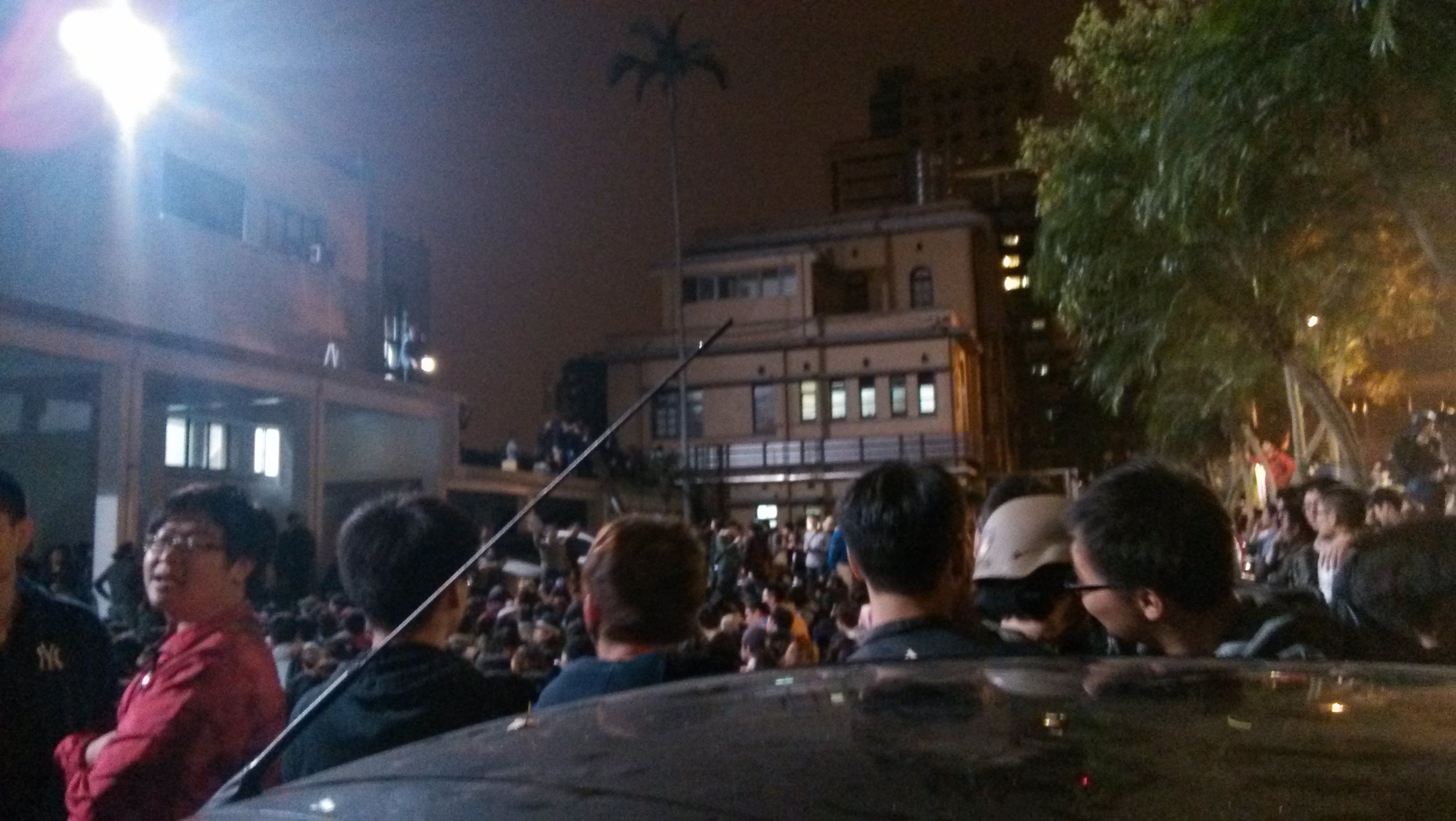 The Legislative Yuan on the night of March 18th, 2014. Photo credit: Brian Hioe
The Legislative Yuan on the night of March 18th, 2014. Photo credit: Brian Hioe
So it’s possible that the Sunflowers may have some further direction which I’m not aware of, or some guidance I’m not aware of, but I think to a large degree we have to accept that all mass movements have the nature of being a reaction against what has happened already. There is almost no movement which is looking towards the future. I think this is a lack here too. There seems to be no game plan for where we go from here.
The History of the Taiwanese Independence Movement
BH: That might be a good segue for the next question, which is about Taiwanese independence. For you, is Taiwanese independence an explicitly Left position? And if not, then why advocate it? For me at least, that is the opaque question of the Sunflower Movement, in which independence was advocated but not often from a Left viewpoint.
LGA: We have a very serious problem here in that there is virtually no Left Taiwanese independence movement now. But there used to be. So I think if we look at a longer historical perspective and back to what I know, in the 1970s and 80s, there was an organization which learned from Su Beng and the name of that organization was Taiwan Era (台灣時代).
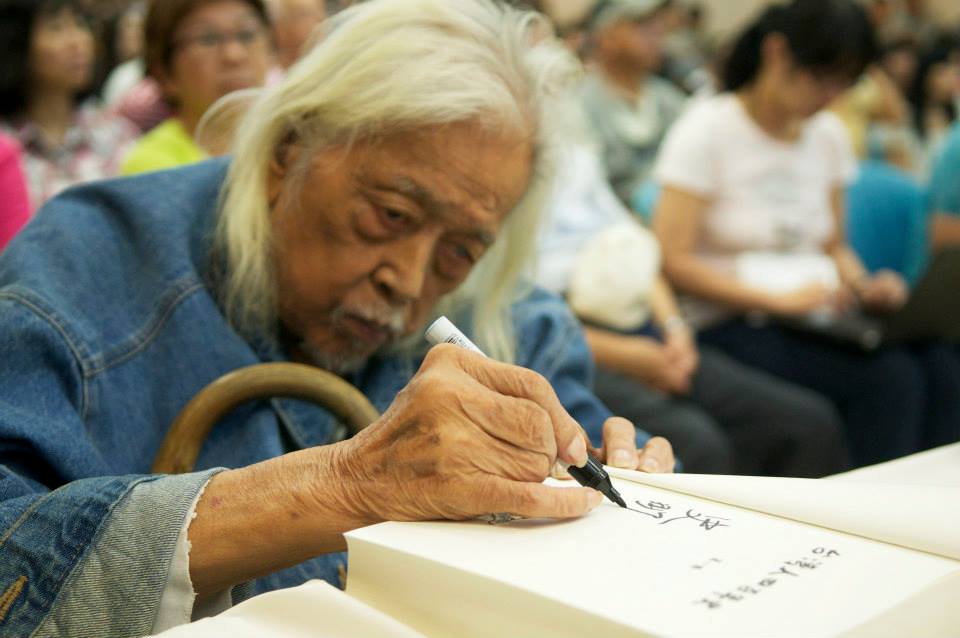 Su Beng signing a copy of Taiwan’s Four Hundred Year History. Photo credit:黃謙賢/People News
Su Beng signing a copy of Taiwan’s Four Hundred Year History. Photo credit:黃謙賢/People News
I’d say that this organization had some reasonably sized underground membership, a hundred or so, I don’t know how many. And a plan for changing the ideology of the overseas Taiwanese. They had quite a plan and quite a campaign in the 1980’s, but this organization basically collapsed in 1986 when democracy began to open up in Taiwan, with the formation of the Democratic Progressive Party in Taiwan.
This is of course the common problem for Left parties. Similar things have happened in the Philippines also. But, of course, if there is some opportunity to change the political structure without an underground organization or without the threat of violence, people want to go that way. It seems to me it’s rather sad that the Taiwanese Left has disappeared with almost no trace, with very little documents or anything left. But I believe the overseas movement and the various Leftist movements which came back to Taiwan from overseas did influence the direction for Taiwan.
The founder of the Green Party, Kao Cheng-yen, was a member of Taiwan Era. Chen Wen-cheng was an important member of Taiwan Era. I met him in Pittsburgh in May 1981, not long before he was killed in Taiwan. Also the founder of Taiuan-e-tiam, Wu Cheng-san, he also was a very early editor of Taiwan Era. There are many other people whose names I can’t list. So I think that in many ways which cannot be said clearly, there has been some impact of these overseas idealists.
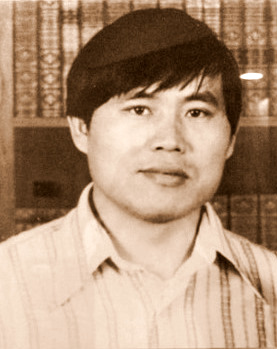 Chen Wen-Cheng, an assistant professor of mathematics at Carnegie Mellon University, was found dead on the campus of National Taiwan University in 1981. The Taiwan Garrison Command, the secret police during the authoritarian era, denied it had anything to do with his death
Chen Wen-Cheng, an assistant professor of mathematics at Carnegie Mellon University, was found dead on the campus of National Taiwan University in 1981. The Taiwan Garrison Command, the secret police during the authoritarian era, denied it had anything to do with his death
That’s on the Taiwanese independence side. Of course, on the pro-PRC side, it’s also true they had an impact on Taiwan social movements.
But the overall question you asked me was what do I think about the Taiwanese independence movement overall. I think because the Taiwanese independence movement has never taken on the larger issues of what is the US direction—what they can expect from the US—they’re almost back in the Japanese period in which the Taiwanese were always petitioning the Japanese Diet, fruitlessly.
FAPA and all these Taiwanese-American organizations are continually petitioning the US State Department or Congress, whereas structurally we know that the US supports dictatorships, supported Chiang Kai-Shek, agreed on the Shanghai Communique in its compromise with China, and has never changed its mind about the Shanghai Communique. The US also enforces that anti-independence position on Taiwan’s leadership, such as it did when Chen Shui-bian was president.
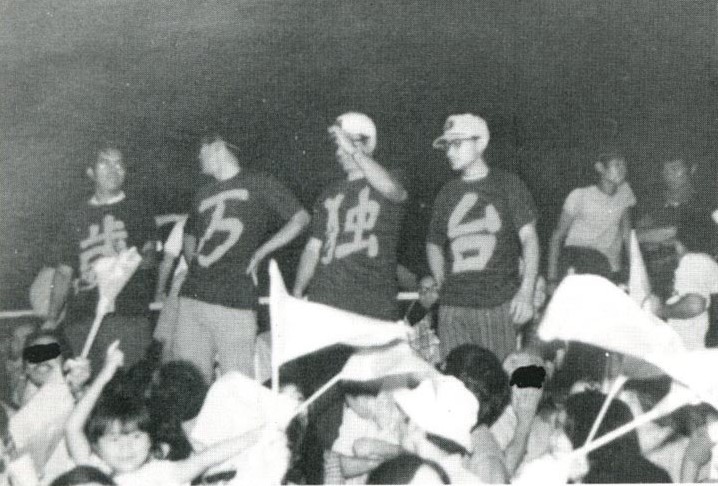 Photo credit: taiwannation.org
Photo credit: taiwannation.org
I think it is obvious that no change in the position of the US government can be expected. But much of the Taiwanese independence movement is still hanging on every word of the US, including US conservatives, and expecting some change of position by the US. And I think this is totally unrealistic. They have all their eggs in one basket and they don’t have any other baskets.
To be nasty, I think at this point, most of the Taiwanese independence movement is an old people’s club. And probably I belong to their old people’s club, too, even if I let off a few firecrackers.
Why Has the Taiwanese Independence Movement Historically Been So Pro-American?
BH: Why do you think that the Taiwanese independence groups and, particularly, Taiwanese-American groups have been so pro-American? Despite the obvious fact that the US backed the KMT.
LGA: I think they’ve never really faced that fact and not facing that fact is related to their lack of international study, but also due to their own class interests based in Taiwanese-American society and Taiwanese international businessmen. That they don’t see the pattern that the US has supported dictatorships in the Philippines, in Korea, Latin America, all over the world, over extended periods. Even now, we see new dictatorships in the Middle East, even after the Jasmine Revolution. The US has accepted the military coup in Thailand and in Egypt. Why not?
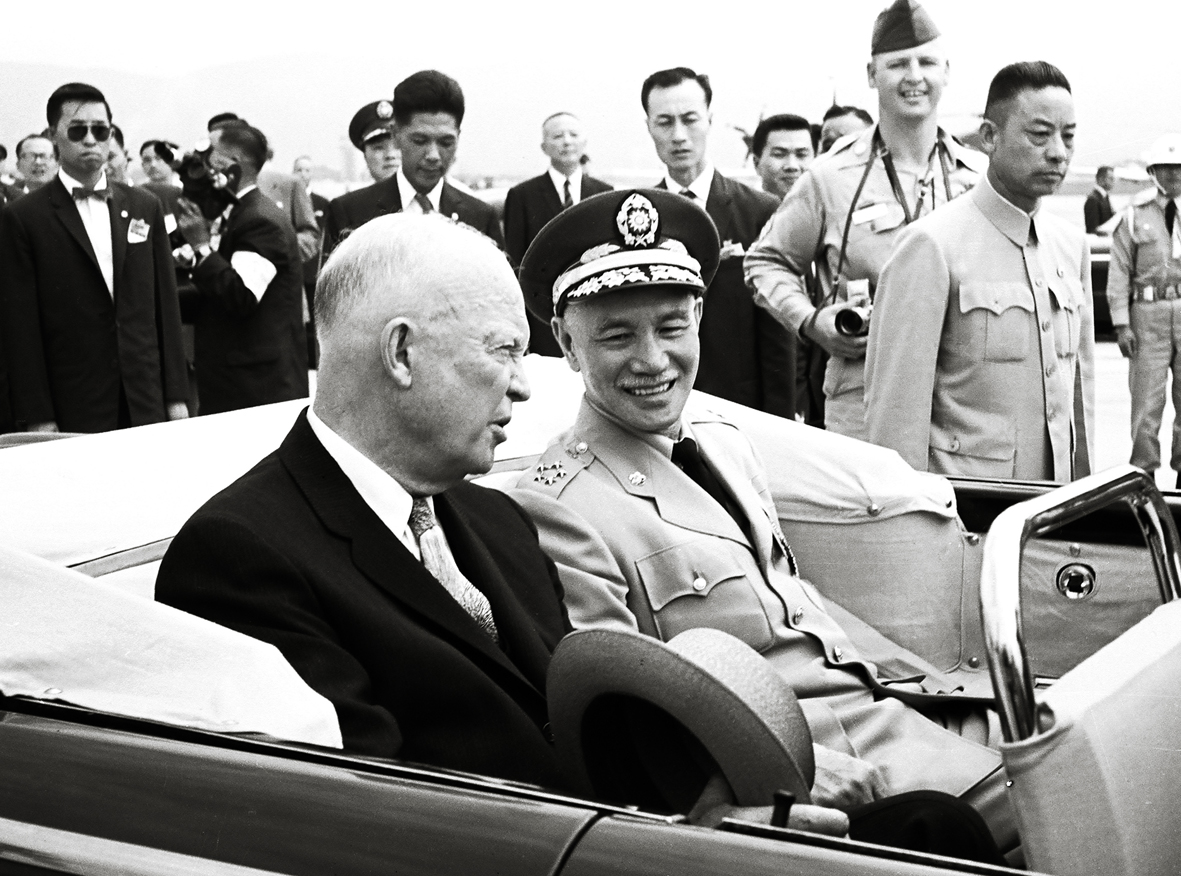 Chiang Kai-Shek and Dwight D. Eisenhower in 1960
Chiang Kai-Shek and Dwight D. Eisenhower in 1960
And I think we have to look the sociological facts that most of the early Taiwanese in the United States went to the United States in the Brain Drain period, got good jobs in the military-industrial complex, have prospered with the American Dream, and are part of the American middle or middle-upper classes, and actually have very little understanding of progressive politics even in the US, much less what happens elsewhere.
That’s one aspect. The other aspect is that Taiwan in the international perspective is what I would call a labor aristocracy. Or a semi-periphery. In the Wallersteinian scheme of center, periphery, semi-periphery, it is clear that Taiwan is a semi-periphery in a comprador position in which it benefits from the global capitalist structure. And we see this now particularly in the last twenty years, with Taiwan having more and more of a middle-upper class type of life. So I think Taiwan’s position in the international economic structure, which has been facilitated and maintained by the United States, determines that it stays within the structure of US interests. It’s not surprising that this society will stay within the mentality which is set by US hegemony.
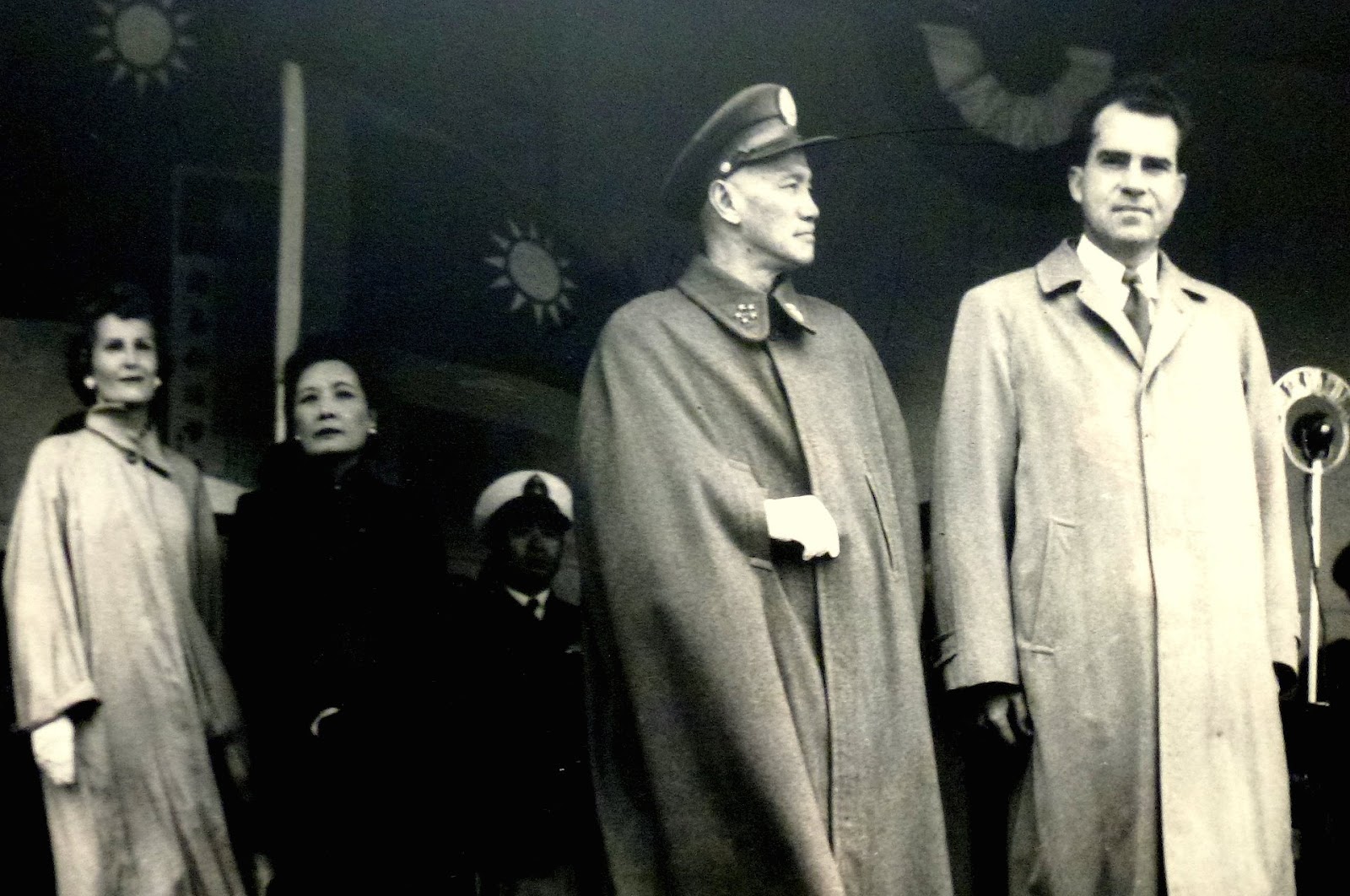 Richard Nixon and Chiang Kai-Shek in 1972
Richard Nixon and Chiang Kai-Shek in 1972
These two facts—the class position of Taiwanese in the US and the position of Taiwan in the world economy—very much determine this mindset. You add to that, of course, the anti-Communist education under the KMT since the 1950s and even before that under the Japanese and I think we have a very stable kind of structure which is very conservative.
But actually it is more conservative than it was in the 1970s. I think what is interesting to see is that after the formation of the DPP, and as the DPP moved into a system of opposition within the structure in which Taiwanese capitalists support the DPP, it is courting the development of Taiwan within the world capitalist structure. I think this political position is in a way overdetermined.
I have a Taiwanese friend who is personally very close to State Department and CIA personnel and has inside information. He thinks it would have been possible for Taiwan to steer a route towards independence if people in Taiwan, if Lee Teng-hui, Chen Shui-bian, etc., had a little more gumption. Had a little more guts to take some risks. I think Taiwan had the possibility for actually claiming sovereignty in the Lee Teng-Hui period, right after the Tian’anmen Incident, or even in the Chen Shui-Bian period. But the window of opportunity for formal sovereignty is pretty much eclipsed now by China’s economic rise and the change in the relationship between the US and China.
That’s a very pessimistic thing to say. Part of this pessimism is also due to the cowardice of the DPP. The DPP has just been looking at the Taiwan populace’s fear of China and they dropped mention of their Taiwan independence position quite early. They dropped it or they avoided it or whatever, and it’s really too late to bring it out again now. We have to say that they have shown great opportunism. I think that they have not given the leadership which we would have expected of this party, considering its origins among people who took on martial law.
Taiwan and the International Left
BH: So then the next two things I wanted to ask was about the kind of status of Taiwan on the international Left. Because we just talked about how Taiwanese self-proclaimed Leftists often do not think of Taiwan in an international framework. Moreover, I think Taiwan is generally just thought of on the international Left as, you know, a capitalist bulwark or a reactionary bulwark against China. Do you think that can be changed in regards to trying to raise awareness of Taiwan? For example, I’ve raised the issue of Taiwan in a self-determination framework.
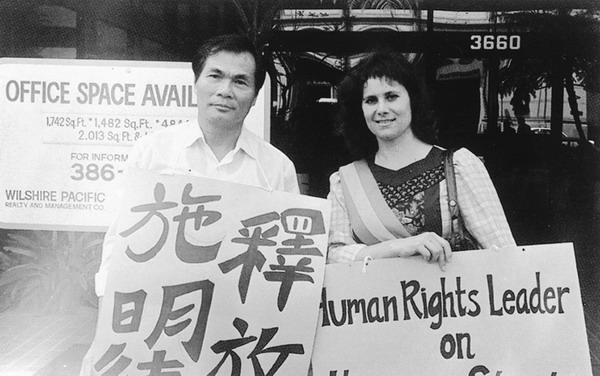 Arrigo demonstrating for the release of Shih Ming-de during his imprisonment. Photo credit: 台灣烈士許昭榮與台籍老兵紀念集
Arrigo demonstrating for the release of Shih Ming-de during his imprisonment. Photo credit: 台灣烈士許昭榮與台籍老兵紀念集
LGA: I think if you have a group of at least a hundred people who have that position, if there is some kind of organization which states its position, which has some resolve to do international relations, I think it is possible to develop an international framework.
Internationally, even on the Left, there is some critique of China. So I think it’s possible to build international relations, but it’s not possible unless there’s some public face. You need some kind of public face which shows it has some basis in society in Taiwan. Even if it’s small, it’s possible to do. But to even get that basis is not easy. I’ve tried. I’ve tried quite a lot in this regard.
Planning for the Future?
BH: What you think will happen now that Tsai Ing-Wen has been elected president of Taiwan? How do you think this will affect the independence movement?”
LGA: Taiwan is still locked into the contradiction of its status as “Republic of China”, and Tsai Ing-wen has sworn to the US that she will not change the status quo. China and the international economy have already created an economic interdependence. I don’t think there is much she can do, except slow Taiwan’s assimilation into China. Of course the present moment of Taiwanese pride is significant. But any euphoria that “Taiwanese have stood up!” is overrated. A further concern is that, as under Chen Shui-bian, the old Taiwanese independence zealots will accept the ROC status quo as legitimate, or the best they can get, the easy way out of further commitment, and time to retire. I think the future here is up to the younger generation. Social issues are likely to take priority, and I think that is a good thing and a basis for Left Taiwanese independence mobilization.
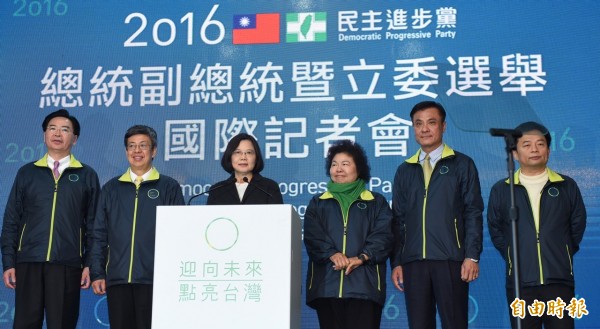 Tsai Ing-Wen declaring victory on presidential elections on January 16th, 2016. Photo credit: Liberty Times
Tsai Ing-Wen declaring victory on presidential elections on January 16th, 2016. Photo credit: Liberty Times
BH: The last thing I would ask is, what would you say to those of the current generation who seek to establish a basis for Taiwanese independence from a Left political point of view? Do you have words of advice or caution?
LGA: The Sunflower Movement in Taiwan and probably other people who want to say they are Left have not taken enough of the lesson of the very drastic things which have happened in other countries. I thought of this more recently. When democratic process is going on, people seem to believe that this is the real thing, that democracy really is carrying weight.
Well, it does carry considerable weight, but it is not the last word. And you can see in for example Egypt, Egypt had a popular uprising, it had a democratic government put into place. When that democratic government elected a president that was not popular with the US, too Muslim, he was overthrown with a military coup.
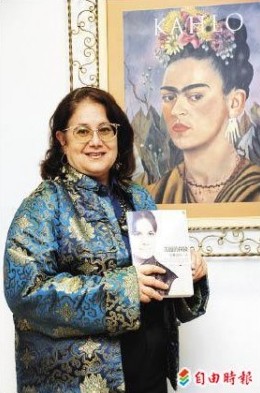 Arrigo holding up a copy of her autobiography, A Beautiful View From the Brink: Linda Gail Arrigo and the Taiwan Democratic Movement. Photo credit: 趙世勳/Liberty Times
Arrigo holding up a copy of her autobiography, A Beautiful View From the Brink: Linda Gail Arrigo and the Taiwan Democratic Movement. Photo credit: 趙世勳/Liberty Times
And I think that the Taiwanese student movement and other student movements must realize that there is always the possibility of armed intervention or any kind of intervention by China, there is still the possibility perhaps of a military coup within Taiwan or some kinds of other physical reprisal. This is all possible. And if you look at other countries, this has occurred again and again.
When the democratic process is going to pull down some kind of powerful structure, that powerful structure is likely to strike out, in quite a desperate way, successfully or not. But I think that the student movement and any movement must be aware of this possibility and must have some contingency plans. They should have some thinking on this issue and some plans.
Although these structural factors and history mean it may be very difficult for a leftist Taiwan independence position to surface, the global forces for polarization are likely to continue to create a response of resistance, and such a position should be viable in the long run. I think there is a parallel in the appearance of Bernie Sanders, a self-proclaimed socialist, as a presidential candidate in the United States – most strongly supported by youth. I was surprised by this, as I was by the election of President Obama. There may yet be unexpected changes in Taiwan, and in such a time of change as with the demise of the Kuomintang, social movements should push for their advantage and gain space.



 The front of the Legislative Yuan during the Sunflower Movement. Photo credit: Brian Hioe
The front of the Legislative Yuan during the Sunflower Movement. Photo credit: Brian Hioe The Legislative Yuan on the night of March 18th, 2014. Photo credit: Brian Hioe
The Legislative Yuan on the night of March 18th, 2014. Photo credit: Brian Hioe Su Beng signing a copy of Taiwan’s Four Hundred Year History. Photo credit:黃謙賢/People News
Su Beng signing a copy of Taiwan’s Four Hundred Year History. Photo credit:黃謙賢/People News Chen Wen-Cheng, an assistant professor of mathematics at Carnegie Mellon University, was found dead on the campus of National Taiwan University in 1981. The Taiwan Garrison Command, the secret police during the authoritarian era, denied it had anything to do with his death
Chen Wen-Cheng, an assistant professor of mathematics at Carnegie Mellon University, was found dead on the campus of National Taiwan University in 1981. The Taiwan Garrison Command, the secret police during the authoritarian era, denied it had anything to do with his death Photo credit: taiwannation.org
Photo credit: taiwannation.org Chiang Kai-Shek and Dwight D. Eisenhower in 1960
Chiang Kai-Shek and Dwight D. Eisenhower in 1960 Richard Nixon and Chiang Kai-Shek in 1972
Richard Nixon and Chiang Kai-Shek in 1972 Arrigo demonstrating for the release of Shih Ming-de during his imprisonment. Photo credit: 台灣烈士許昭榮與台籍老兵紀念集
Arrigo demonstrating for the release of Shih Ming-de during his imprisonment. Photo credit: 台灣烈士許昭榮與台籍老兵紀念集 Tsai Ing-Wen declaring victory on presidential elections on January 16th, 2016. Photo credit: Liberty Times
Tsai Ing-Wen declaring victory on presidential elections on January 16th, 2016. Photo credit: Liberty Times Arrigo holding up a copy of her autobiography, A Beautiful View From the Brink: Linda Gail Arrigo and the Taiwan Democratic Movement. Photo credit: 趙世勳/Liberty Times
Arrigo holding up a copy of her autobiography, A Beautiful View From the Brink: Linda Gail Arrigo and the Taiwan Democratic Movement. Photo credit: 趙世勳/Liberty Times